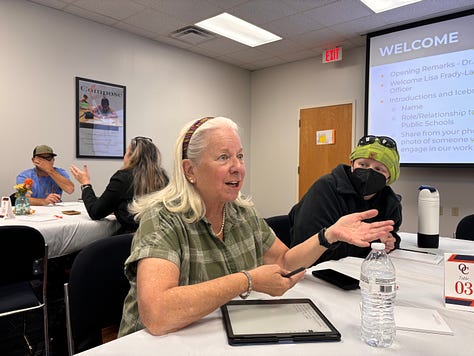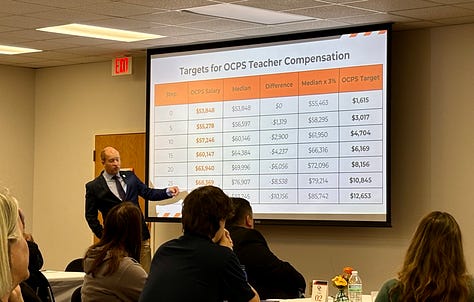Montpelier President and CEO Eola Lewis Dance resigns
Surprise announcement comes just a week before the Montpelier Races
Eola Lewis Dance, president and chief executive officer of James Madison’s Montpelier, announced Friday afternoon that she is resigning from the position she has held for the past 15 months. The unexpected news comes just a week before the presidential estate’s signature event, the Montpelier Hunt Races.
Krista Costello, Montpelier’s chief operating officer, will serve as acting president and CEO until the Montpelier Foundation’s board of directors chooses Dance’s successor. Dance’s resignation is effective November 11.
The official reason for her departure, according to her public announcement, is that Dance has family needs requiring her full attention. A confidential source told Byrd Street that Dance had informed the Montpelier Foundation’s board that she planned, after race day on Saturday, Nov. 2, to announce her resignation. According to the confidential source, the foundation board said, ‘Nope. Do it now.’”
The source added that while Dance was not forced to resign, she likely would have been told to do so if she hadn’t chosen to make the move on her own.
The 2,650-acre estate has struggled to raise funds in recent years, and Dance had little success in that crucial area. On Constitution Day (September 21) at Montpelier, her fundraising goal for that day alone was $1 million. The final tally, including pledges, was $56,335—not bad for a day’s work but well short of the ambitious target.
Byrd Street’s source noted of Dance’s exit, “I think it was mostly about fundraising, but I think there was also just a lack of a good fit.”
Dance came to Montpelier with 22 years of experience with the National Park Service. Personable and forthright, fair-minded and deeply interested in the history of Montpelier, both the presidential side and the enslaved community side, she seemed at the time like a fine fit—save for her lack of experience in fundraising.
A protracted period of tumult
Montpelier had experienced a great deal of upheaval before her arrival in the summer of 2023. The storied estate had earned widespread praise and goodwill when the board announced plans to institute “structural parity” by substantially increasing the number of Black board members. The idea was to better represent the full history of Montpelier, where hundreds of enslaved people lived, worked and died during the Madison era. But the good vibes and good press vanished when the majority-White board indicated it wasn’t completely committed to structural parity after all. In response, James French, a board member at the time, launched a very public campaign to keep structural parity front and center.
After a protracted period of tumult, a new, majority-Black board of directors emerged, with French as the chair. Then-President and CEO Roy F. Young II stepped down. French rehired Dr. Matthew Reeves, Montpelier’s director of archaeology and landscape restoration, and Dr. Elizabeth Chew, Montpelier’s previous executive vice president and chief curator, both of whom had been fired during Young’s tenure due to their support of French and his cause. The board named Chew acting president and CEO.
After he won his battle, French did not unite the troops. Insiders told Byrd Street that he was a micromanager, divisive and quick to criticize the people trying to do his bidding. Less than a year after his election as board chair, he demoted Chew, previously one of his most eloquent supporters, and one of a very few people who fully grasped the challenges that Montpelier faced. After her demotion, Chew didn’t stay at Montpelier for long; she is now CEO of the South Carolina Historical Society in Charleston.
In yet another dramatic turn, French’s fellow board members staged something of a coup last year and voted him out of his top post. He left the board altogether in June 2023. Dr. Hasan Jeffries, a history professor at Ohio State University, emerged as the new board chair. When Dance was named soon thereafter as president and CEO, it seemed that at last Montpelier’s board and staff—and maybe even all its beautiful trees—could exhale and relax for a while.
Trial by fire, literally
But there was more trouble to come. In April of this year, a fire tore through Montpelier’s archaeology office and lab. While firefighters and staff were able to salvage most of the artifacts, the damage was tremendous and the emotional toll, especially on head archaeologist Reeves, was great. Rising to the terrible occasion, Dance drew on her National Park Service training in crisis management to bring together and reassure her staff, and she quickly make plans to move the archaeology department across Route 20 to the Esso building, which Montpelier owns. A grateful Reeves credited her for her calm resolve and steady leadership.
And yet this summer, even after a year on the job, it seemed that Dance still hadn’t settled in. She had not moved to Bassett House, traditionally the president’s home at Montpelier, and often worked remotely from her home in the Tidewater area. An inside source told Byrd Street that it was hard for Dance to get to know her staff when she wasn’t around much during the week. During her weekend visits to the property, many staff were not around. Working remotely also may have hindered Dance’s ability to get to know potential donors and persuade them to make major gifts.
Still, Dance has good friends and supporters at Montpelier, one of whom is Reeves. From the beginning, long before the fire that wrecked his office, Dance championed and supported his tireless efforts to complete the Memorialization Project honoring the enslaved people whose history at Montpelier went unacknowledged for a long time. He has consistently spoken highly of her.
Reeves emailed Byrd Street, “It has been an honor to work with Eola, and I really appreciate the level of expertise that she brought to her position. She will be missed here at Montpelier, and we are a better place because of the time she spent with us.”
Dan Hornick’s roundtable promotes understanding of school budget
Nearly 50 people, mostly Orange County teachers, staff and school board members, showed up for the first Superintendent’s Budget Roundtable on Tuesday evening (Oct. 21). Superintendent Dr. Daniel Hornick gave an introductory talk on the complexities of balancing funding priorities, such as raises for teachers and staff, with the realities of county and state funding.
Then, members of the central office staff each presented their funding needs. The long list included metal detectors, wearable security devices (aka “panic buttons”) that teachers can activate in case of school emergencies, lawnmowers, replacement vehicles for the transportation department, a new reading specialist, professional development for kindergarten-8th grade teachers in the “science of reading” and permanent substitute teachers assigned to each school.
Participants then engaged in their own small-group budgeting sessions. Each table’s assignment: Divide up an imaginary million dollars for the school system, based on the presentations they had just heard.
As I moved from table to table, I could tell that each group was taking the exercise seriously. Team members carefully weighed the needs they had just heard described. Inevitably, different groups came to different conclusions. Many agreed, however, that it was important to keep the schools’ lawns and playing fields well-groomed—hence, the lawn mowers often made the cut. Many also included security features in their budgets.
Robin Weaver, assistant principal of Locust Grove Primary School, said she believed the exercise was helpful. “I think it’s good, it’s authentic. It will definitely help us put on a different pair of lenses when we have these [budgeting] discussions with teachers.”
Joe and Donna Loftus of Orange were among the community members taking part in the roundtable. Joe had this to say as his group wrapped up deliberations: “Budgeting is a whole lot more complicated that I thought. It’s not a very enviable task.”






Early voting continues—Election Day is Tuesday, Nov. 5
If you want to vote early, you still can. Click here for details.
Orange County tax deadline approaches
The deadline to pay Orange County personal property taxes and the second half of real estate taxes is Thursday, Dec. 5. If you didn’t receive your bill, call the county treasurer’s office at (540) 672-2656. To see the various ways you can pay your county tax bill (online, in person, by mail), click here.
Coming up soon—or happening today
23rd Community/Regional Health Fair, Shady Grove Baptist Church, 21024 Piney Woods Road, Orange; free health screenings, 9 a.m.-1 p.m., Saturday, Oct. 26
“The Art of Happiness,” a Dharma talk by Lama Tashi, The Music Room, 135 East Main St., Orange, 2 p.m., Saturday, Oct. 26
“Trunk or Treat,” Orange Elementary School, 5:30-7 p.m., Saturday, Oct. 26
“Gioioso! A Celebration Concert,” music for organ, with brass, chorus and soloists, Orange Presbyterian Church, 2 p.m., Sunday, Oct. 27
Rapidan Orchestra Fall Concert, The Music Room, 135 East Main St., Orange, 7 p.m., Friday, Nov. 1, and 2 p.m., Sunday, Nov. 3
Montpelier Hunt Races, Saturday, Nov. 2
Election Day, Tuesday, Nov. 5
The Arts Center in Orange Annual Fishbowl Fundraiser, 6-9 p.m., Saturday, Nov. 9
Obituaries
Shirley Ann Simon Woodard, 77, Rapidan; Donald Alonzo Lewis, 68, Gordonsville; Ryan David Endersby, 46, Orange; Sue Roper Hromyak, 73, Orange.
Recent back issues of Byrd Street
Orange County Schools to host budget roundtable (Oct. 19)
Poke the bear: Mark Johnson ignores requests for info on water crisis (Oct. 9)
RSA gets dunked for its handling of Orange County water crisis (Oct. 2)
Arrest made in Orange Elementary gun case (Sept. 25)
Meet the Orange Town Council candidates (Sept. 22)



Great article. Sadly for Montpelier, yet another DEI project tanks. Merit is the only metric that should be utilized when selecting managment.
Excellent, balanced writing, as always. I appreciate this in-depth reporting.